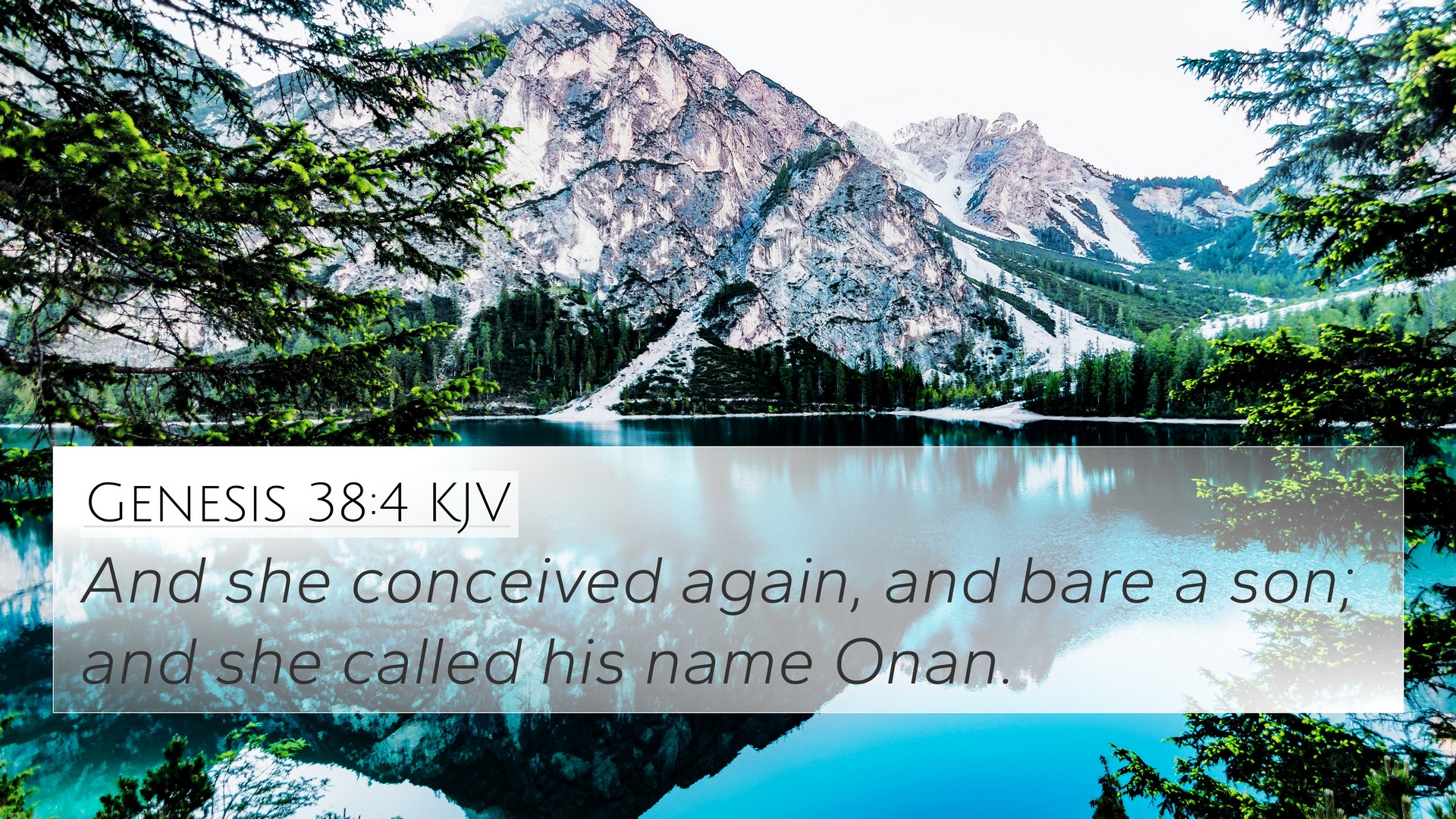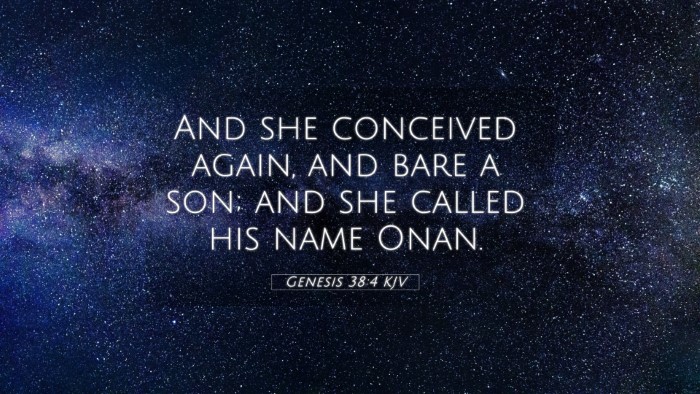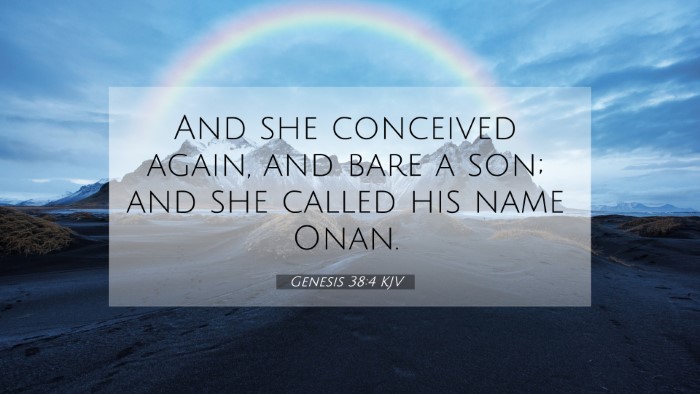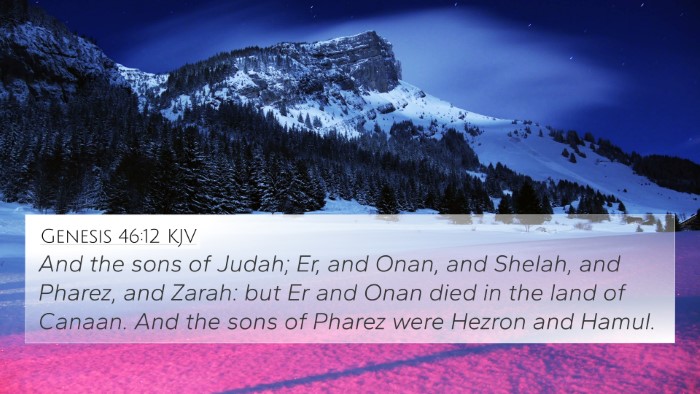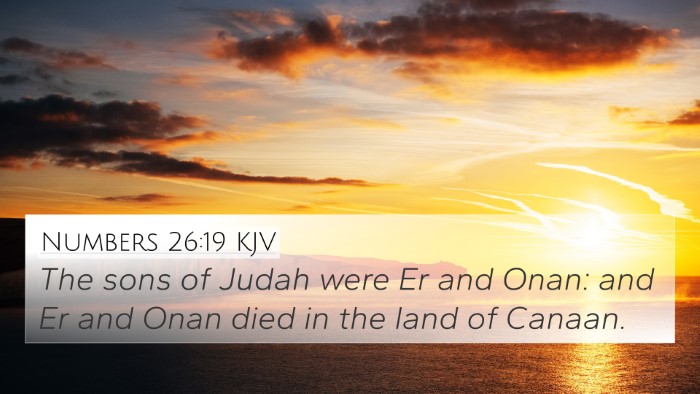Understanding Genesis 38:4
Genesis 38:4 states:
"And she conceived again, and bare a son; and she called his name Onan." (KJV)
Summary of Meaning
This verse is situated in the narrative concerning Judah and Tamar, revealing key aspects of family lineage and the importance of offspring in biblical culture. The birth of Onan is significant as it sets the stage for understanding the customs surrounding levirate marriage and the responsibilities of a brother to continue the family line.
Contextual Background
Genesis 38 is a complex chapter that shifts the focus from Joseph's story to Judah’s life, illustrating the moral and social challenges faced by Judah. Through this familial story, the text opens discussions about duty, morality, and God's providence in human affairs.
Insights from Commentaries
-
Matthew Henry:
Henry emphasizes the cultural norms of the time, explaining that having sons was regarded as essential for inheritance and family legacy. The conception of Onan highlights the continuing saga of God's chosen line and the significance of each family member in fulfilling divine promises.
-
Albert Barnes:
Barnes interprets Onan's birth as an essential link in the chain of biblical genealogy. He notes that the narrative serves to show God's overarching plan through human actions, even when those actions diverge from perceived moral righteousness.
-
Adam Clarke:
Clarke provides a detailed etymological analysis of the names involved, showcasing how names in the Old Testament often carry deep meanings that reflect the circumstances of their birth. Onan’s name suggests “strength” or “vigor,” indicating hope for Judah’s lineage amidst personal turmoil.
Thematic Bible Verse Connections
Genesis 38:4 connects to several broader themes, including the significance of lineage, the complexities of familial relationships, and God's providential workings despite human challenges. Below are some related Bible verses:
- Genesis 38:8: "And Judah said unto Onan, Go in unto thy brother's wife, and marry her, and raise up seed to thy brother." - This highlights the levirate principle.
- Deuteronomy 25:5-6: "If brethren dwell together, and one of them die, and have no child, the wife of the dead shall not marry without unto a stranger: her husband's brother shall go in unto her..." - Further exploring the duty of a brother.
- Ruth 4:10: "Moreover Ruth the Moabitess, the wife of Mahlon, have I purchased to be my wife, to raise up the name of the dead upon his inheritance..." - Demonstrating the continuation of family lines.
- Matthew 1:3: "And Judas begat Phares and Zara of Thamar..." - Linking the genealogy of Jesus back to this narrative.
- Romans 8:28: "And we know that all things work together for good to them that love God..." - Reflecting on the divine orchestration of events in human stories.
- Hebrews 11:32-34: "And what shall I say more? for the time would fail me to tell of Gideon, and of Barak, and of Samson, and of Jephthae;..." - Discussing the heroes of faith, including references to familial obligations.
- 1 Chronicles 2:3-4: "The sons of Judah; Er, and Onan, and Shelah..." - Establishing Onan's historical import in Judah’s family.
- Matthew 22:24: "Saying, Master, Moses said, If a man die, having no children, his brother shall marry his wife..." - Reaffirming the levirate marriage tradition recognized in the New Testament.
- Acts 1:16: "Men and brethren, this scripture must needs have been fulfilled, which the Holy Ghost by the mouth of David spake before concerning Judas..." - Alluding to divine plans and human actions throughout scripture.
- Genesis 49:10: "The sceptre shall not depart from Judah, nor a lawgiver from between his feet..." - Prophetic significance attributed to Judah's lineage.
Cross-Referencing Biblical Texts
To fully understand Genesis 38:4, one should engage in comparative Bible verse analysis using a cross-reference Bible study approach. This entails:
- Utilizing a Bible concordance to find related themes and stories.
- Employing comprehensive Bible cross-reference materials for thematic connections to both Old and New Testament scriptures.
- Linking biblical scriptures through verse parallels to enrich understanding.
- Exploring tools for Bible cross-referencing to identify themes present in the narrative and their implications for Christian theology.
Conclusion
In conclusion, Genesis 38:4 is not merely a historical record; it serves as a pivotal moment in the narrative of God's people, portraying the intricate dynamics of family, duty, and divine purpose. Through inter-Biblical dialogue and scriptural cross-referencing, deeper insights can be gained, connecting the narrative of Judah, Tamar, and Onan with broader biblical themes of lineage and responsibility.
